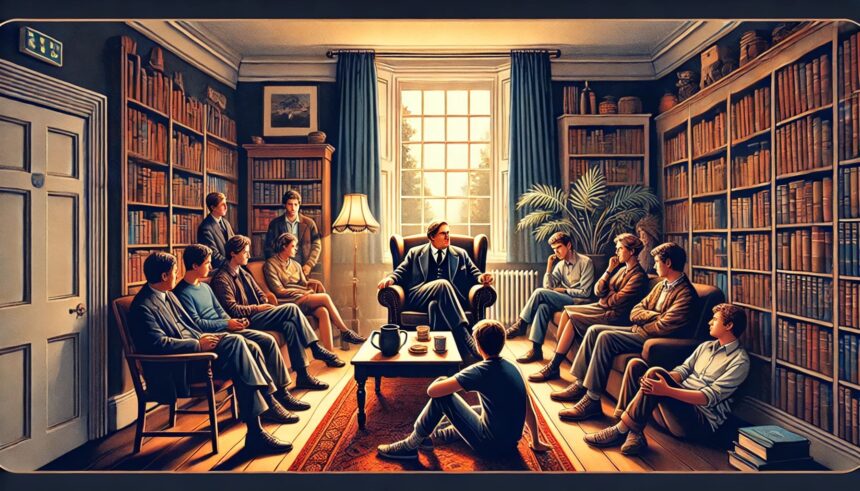
Although the most illustrious honors in economics, such as the Nobel Prize, are typically awarded to specialists in the field, many of the most penetrating economic insights do not come from economists. To look exclusively to economists for economic insights would be as misguided as expecting to learn everything about movies from movie critics. For one thing, most movie critics have never made a film. More importantly, learning which movies are good or bad is usually less important than determining whether or not to go to the cinema in the first place. Likewise, economics offers insights into the economic sphere of life, but opting to think exclusively in economic terms would be as absurd as spending all one’s days gazing at the big screen. There is a difference between managing scarcity and leading a full life, just as there is a difference between watching movies and actually living.
Few 20th-century critics made this point with more force and effect than the poet T.S. Eliot, who received the Nobel Prize for Literature in 1948. Born Thomas Stearns Eliot in St. Louis, Missouri in 1888, Eliot was the scion of a prominent Boston family and attended Harvard University before moving to England at the age of 25 and renouncing his American citizenship 14 years later. Among his most notable poetic works are “The Love Song of J. Alfred Prufrock” (1915), “The Wasteland” (1922), and “Four Quartets” (1943). Eliot was also an accomplished essayist, publisher, critic, and editor. Of special interest for present purposes are two of his prose works, Christianity and Culture (1949) and “The Aims of Education” (produced in 1950 and 1951 and published posthumously), the latter based on a series of lectures that he delivered at the University of Chicago while he was teaching in the Committee on Social Thought, from which I received a degree. In this latter work, he outlines three aims of education: preparing to earn a living, be a citizen, and pursue perfection.
To say that earning a living and all the economic benefits that come with it—a degree of self-determination, a measure of security amid the vicissitudes of life, and above all, the ability to make purchasing choices among various available goods and services—is just one aim of education is to make a profound anthropological declaration—namely, that Homo economicus is at best an incomplete model of the human. To be sure, we can tell a lot about people by their spending choices. Every expense can be regarded as an act of self-declaration. In 1925’s “The Hollow Men,” Eliot writes of “The hollow men, the stuffed men, leaning together, headpiece filled with straw.” Even if we had access to the receipts for every single purchase a person made over the course of a lifetime, a substantial residuum of hopes, fears, and human identity would remain.
Of course, the same would apply to earnings. Suppose we possessed every person’s lifetime financial records, including every penny they ever earned. Would we be able to tell from the total amount or the increments in which their wealth was accrued what path they had followed in life? Suppose these lifetime earnings amounted to millions of dollars—would we know whether we were dealing with lawyers, bankers, or doctors? Even in the case of someone who earned very little, would we be able to tell who had served as the homemaker of a thriving household and who had lived in penury? Most people endure poverty as an unwanted state. In “The Waste Land,” Eliot writes, “I will show you fear in a handful of dust.” Yet others, such as members of some religious orders, choose poverty voluntarily. They regard it not as a curse but a kind of blessing, in the sense that not having money frees them to focus on more significant matters in life. And of course, some people acquire vast wealth through nefarious means. A wallet biopsy provides some insight into a person, but it also leaves a great deal to the imagination.
We want most people to earn a living, or at least to find an arrangement in life that renders them financially self-sufficient, but it is possible to achieve economic self-sufficiency and still lead a lamentable life. Such people might have enough money to provide for all material needs, yet nonetheless feel miserable and regard life as a burden—they might hate their jobs, because they regard their work as meaningless, degrading, or even harmful to themselves and others. Likewise, their personal circumstances might render their lives unhappy. Perhaps they are alone and lonely, or they are involved in a personal relationship that yields nothing but fear, anger, or recrimination. A few of the most economically well-off people I have known have also been among the more unhappy, partly because they were tormented by envy, an acute awareness of the fact that there were others who had still more.
Eliot comes to the rescue. Most of us do not aim to educate our children and grandchildren to be mere vendors and consumers. Earning a living and spending and saving money well are good things we wish for them, but we also hope that they will be good human beings who enjoy the truly good things in life, many of which cannot be bought or sold. They should, in other words, not overly esteem money, and they should know that it cannot buy an education. To be sure, well-off young people might manage to obtain admission to elite educational institutions merely by donating large sums of money and even pass courses and receive degrees through wealth-fueled academic misconduct. Yet no matter what formal credentials they managed to acquire, they would still lack the knowledge, skill, and experience such an education can provide. We do not want to be remembered by the wind, as Eliot writes in the “Choruses from the Rock,” (1934), “Here were decent godless people: their only monument the asphalt road and a thousand lost golf balls.” Ultimately, education is not primarily a commodity, but something approaching an end in itself, in that it enables us to make the sorts of choices that characterize good citizens, neighbors, and family members.
Notwithstanding speeches of countless politicians urging their fellow citizens to get off the welfare rolls and advance their nation’s capacity to compete in the global marketplace, it is simply not the case that education’s sole or even primary purpose is to advance economic security and prosperity. Sober reflection makes clear that we want more from our schools, colleges, and universities, precisely because we want more out of life. Consider the matter of legacy, what we hope to bequeath to those who come after us. Writes Eliot in “The Idea of a Christian Society,” “Was our society, which had always been so assured of its superiority and rectitude, so confident in its unexamined premises, assembled round anything more permanent than a congeries of banks, insurance companies, and industries, and had it any beliefs more essential than a belief in compound interest and the maintenance of dividends?” In other words, will we turn out to have been little more than makers and spenders of money, whose meager quality of life rises and falls with the value of our investment portfolios?
If so, we would do well to heed the words of one of Eliot’s fellow poets, William Wordsworth, who wrote, “The world is too much with us; late and soon, getting and spending, we lay waste our powers.” If every bad thing in life could be avoided and every good thing in life could be won simply by making sound purchasing decisions, it might make sense to confine our attention to the world of commerce. In the making and spending of money we can destroy ourselves. To be sure, a good education can help in developing the kind of character that insulates against such misfortune, but it also has purposes that far transcend the fungible. Families, friends, and the wise are not attempting to exploit one another for financial gain, but to develop and enjoy one another in ways that supersede a person’s net worth. As Eliot himself suggests, the profit motive may propel economic progress, but it must not be allowed to “hypertrophy into a social ideal.”
Consider the work of Eliot’s contemporary, Edward Bernays, nephew twice-over of psychoanalyst Sigmund Freud, who saw perhaps more clearly than his uncle the implications of a human psyche dominated by the id. The self-styled “father of public relations,” Bernays pioneered a new approach to marketing that aimed to exploit human psychological limitations for the profit of his clients. Faced with poor sales among women, for example, he rebranded cigarettes “torches of freedom,” aligning perhaps the greatest single public health scourge of the 20th century with the nascent women’s liberation movement, which eventually allowed lung cancer rates among women to catch up completely to men’s. Ironically, he was never able to convince his own wife, Doris, to kick the habit, and she pre-deceased him by a decade and a half. Bernays reconceptualized decisions on the part of his fellow citizens not to purchase a product or service as “sales resistance,” a lesson that one of his most influential acolytes, Joseph Goebbels, put into practice through the Nazi propaganda machine.
Where Eliot saw in literacy the hope for intellectual and cultural flourishing, Bernays saw something quite different. In a 1927 article called “The Minority Rules,” in his book, Propaganda, he wrote:
- Universal literacy was supposed to educate the common mortal into control of his environment. Once he could read and write he would have a mind fit to rule. So ran the democratic doctrine. But instead of a mind, universal literacy has given him a rubber stamp, a rubber stamp inked with advertising slogans, with editorials, with published scientific data, with the trivialities of the tabloids and the profundities of history, but quite innocent of original thought. Each man’s rubber stamp is the twin of millions of others, so that when these millions are exposed to the same stimuli, all receive identical imprints. It may seem a wild exaggeration to say that the American public gets most of its ideas in this wholesale fashion. But to say so is merely to state a fact that is as real as it is unrecognized. The mechanism by which it is done is propaganda—propaganda, that is, in its broad sense of an organized effort to spread a particular belief or opinion.
The written word, which Eliot cherished as a medium of human enlightenment, becomes in Bernays’ hands just another means of manipulating mass behavior.
Eliot responds more or less directly to this concern, writing, “What is more insidious than any censorship is the steady influence which operates silently in any mass society organized for profit, for the depression of standards of art and culture.” Where all things are valued for their profit potential, worth becomes displaced by value, the price a product or service brings in the marketplace, and the total amount of revenue generated by its sale. If consumers purchase 100 or 1,000 times as many copies of a Harry Potter novel as Tolstoy’s Anna Karenina or Dostoevsky’s The Brothers Karamazov, then the creative forces of culture turn to producing moral bildungsromans about wizards, and if the billion-dollar ticket receipts of the Marvel cinematic universe dwarf those of films such as “Before Midnight” or “The Tree of Life,” then the culture is flooded with more superhero melodrama. Eliot wants to nurture the psyche and enrich the culture, while Bernays and his ilk are content to plant more ticket-purchasing rear-ends in seats.
“Eliot asserts that while education exerts great sway, culture exerts even greater influence, and to adopt a purely consumerist culture driven entirely by sales figures is to create something that resembles a mass, swept irresistibly along by the tide of the passion of the moment.”
Eliot asserts that while education exerts great sway, culture exerts even greater influence, and to adopt a purely consumerist culture driven entirely by sales figures is to create something that resembles a mass, swept irresistibly along by the tide of the passion of the moment. People are seen and esteemed not so much as free individuals capable of wise choice but in terms of what Eliot calls their capacity for “regimentation and conformity,” opinions and behaviors that can be molded through what both Bernays and Eliot call “propaganda.” Without history, a canon, and largely shared senses of the unseemly and the ideal, the tendency of “unlimited industrialism” will be to turn women and men into mere bodies “detached from the tradition, alienated from religion, and susceptible to mass suggestion; in other words, a mob.” What should be an opportunity for transcending the exigencies of merely material existence—the need for food and shelter and the like—becomes a technologically amplified opportunity to entrain human beings to base passions, the final triumph of Freud’s id over intellect, character, and culture.
Consider the work of Daniel Kahneman, the first psychologist to win the Nobel Prize in Economics. In his 2011 book, Thinking, Fast and Slow, he follows Freud in dividing the human mind into parts, one of which, “system one,” he characterizes as the “reptilian brain.” This aspect of the mind fits Bernays’ purposes well—it works quicky, automatically, and on impulse, often without our conscious awareness. He introduces another part, “system two,” which is both reflective and slower. Kahneman argues that we prefer to use system one, largely because it is easier. In terms of which Bernays would no doubt approve, Kahneman regards human beings as naturally lazy, inclined to get through life with as slight an expenditure of energy as possible. It is precisely this tendency toward mere efficiency that Eliot opposes—the tendency to make choices that require as little effort as possible. We should, instead, invest our best when it comes to weighing the things that matter most. Reading “The Wasteland” or “Four Quartets” may be demanding, but the achievement is commensurate with the effort.
In the end, Eliot concludes, the lower cannot redeem the higher. What is reptilian, or profitable, or expedient cannot rescue what is humane, just, and good. To be sure, it may be “quick and simple” to organize society for ends which, being only material and worldly, “must be as ephemeral as worldly success,” but there is an alternative, and that alternative is a social organization based on truth, which refuses to ignore the essential dignity of human individuals and human culture. We must, Eliot suggests, supplant the appetite to exploit with the longing to enrich, the appetite to extract with the longing to contribute and make a salutary difference in the lives of others. To do so, we need to play our part in creating a culture that sees through the twin economic towers of materialism and efficiency. In this effort, Eliot regards art and culture, and yes, even the Christian faith, as vital resources. As he writes in “The Idea of a Christian Society,” it does not matter how “well-fed, well-clothed, well-housed, and well-disciplined” a mob may be—it is still a mob. The best education is one that lifts us above the level of a mob to a flourishing culture of free and responsible individuals.




